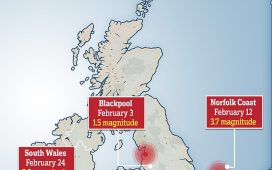[ad_1]
When I was an undergrad learning geology, the maxim that was thumped into me wasn’t how to build a mine or drill for oil and gas, it was simply: “the present is the key to the past”. The thing that took a while to accept was that the past was really, really, long.
It’s hard to comprehend the scale of geologic time: the timespan for continents to crash together and rip apart, for tiny sea-creatures to live, die and condense into kilometres of limestone, or streams to carve epic canyons carrying mountains to the sea. We use comparisons our minds can grasp, such as if all cosmological time was the length of string or compressed into a single year (humans beings appear in the final six hours).
But kids deal with billions of years without a problem – 64 billion is my son’s favourite number. So, when I explained geologic time to my children as we travelled to the last students’ climate rally in Melbourne, they got it: geologically, things happen slowly. And yes, there are exceptions, volcanoes, landslides, earthquakes, to name but a few, but I am talking about the fundamental processes: mountain building, sediment creating, climate changing kind of processes.
Although geologists can handle deep time, they really can’t handle unprecedented rates. It took life millions of years to change the composition of the atmosphere first time round. Granted, that was 2 billion years ago and times, clearly, have changed. However, through all the corridors of conceivable time, evidence indicates the climate has never, ever, changed as rapidly as we see today.
Claude Albritton once wrote:
It has not been easy for man to face time. Some, in recoiling from the fearsome prospect of time’s abyss, have toppled backwards into the abyss of ignorance.”
And ignorance, particularly wilful and entrenched ignorance, is a much harder rock to smash. A fundamental tenet of the scientific method is that there is never certainty in science, only observation, experimentation, hypothesis refinement and the empirical accumulation of evidence. Our past and present leaders exploit that fact, warning of the dangers of scientific consensus as if it reeks of climate conspiracists.
Yes, there have been warmer periods and colder periods in the geologic record and while the effects may be similar, the various causes over time differ. Tony Abbott recently stated that despite there being no humans around in the Jurassic to burn stuff and produce carbon-dioxide, incredibly, the climate was even warmer then – ergo man-made climate change is “absolute crap”. He failed to comprehend the other mitigating factors, like the volcanoes in the southern hemisphere spewing out gases, including, wait for it … carbon dioxide. Our Earth is immensely complex and scientists the world over are doing their best to understand it. So, when they form a consensus, we should listen.
Perhaps we need to explain climate change to sceptical politicians as we would to very small children. Here, let me try. The sun is very, very hot. Heat comes from the sun and enters the Earth’s atmosphere. But, some of that heat bounces off the Earth and heads back out to space. And before the heat escapes off into space, gases in the atmosphere, such as carbon dioxide, capture and absorb it. Consequently, the atmosphere heats up – warms if you will. More heat-absorbing gases in the atmosphere, the greater the impact. It’s really not rocket science, simply Earth science.
Unlike many adults, kids know they have a lot to learn and they actively seek knowledge, they ask teachers, parents, peers. I don’t get it, they say how does it work? Kids love to learn, they are inquisitive, excited and determined – all the characteristics of good scientists. Kind of like all the good climate scientists out there churning out increasingly alarming reports.
While politicians debate the cause, and incredibly, even the validity of climate change, scientists are measuring the effect. Because that’s what scientists do, they measure, they experiment, and they learn. It’s been stated that children will learn nothing from attending climate rallies except how to join the unemployment queue and that is fundamentally wrong. On Friday, children at my kid’s school will spend the morning discussing the protest, what it is about, why it is important and what it is hoped will be achieved. They’ll learn about the atmosphere, hydrosphere and geosphere and how they interact with the biosphere – namely us.
While the past has impacted the future and will continue to do so for some time, decisions we make today are critical in ensuring a safe and sustainable world. Our government is showing an appalling lack of climate leadership, that has just been made glaring obvious on a global scale, with our PM’s decision to not attend the UN climate summit.
But, on Friday, schoolchildren will show that the present is the key to the future. And as a scientist, academic and a parent, I cannot be prouder that my children are standing up for their future.
• Emma White is a hydrogeologist and freelance writer
[ad_2]
READ SOURCE





